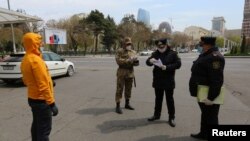Azerbaijan’s media is already restricted but measures imposed to fight the pandemic and recent arrests have renewed concerns among journalists the government may try to further suppress the freedom of information.
“When the COVID-19 pandemic began, we had nearly 10 journalists in prison, and now we are receiving alarming news about arrests and crackdown, not just in the capital city of Baku, but also in the regions,” said Washington-based journalist Alex Raufoglu.
Raufoglu, an Azeri-American journalist with the independent Turan News Agency, said the Azeri government was, in effect, waging a war against information at a time when it should be joining efforts to provide space for the free flow of information.
Since authorities announced a lockdown March 24, at least four journalists have been detained, including Saadat Jahangir, a correspondent for the Azadliq newspaper.
On May 1, agents pretending to be gas workers raided her Baku apartment. The journalist was taken in for questioning and released after eight hours, according to the media watchdog Reporters Without Borders (RSF) and reports.
Azerbaijan ranks 168 out of 180, in RSF’s press freedom index, where 1 is the most free.
Journalists also need accreditation to work during the pandemic but some independent news outlets said they had difficulty obtaining the necessary paperwork.
In a statement Friday, Rep. Alcee L. Hastings and Sen. Roger Wicker, co-chairs of the U.S. Helsinki Commission, said that Azerbaijan, alongside Russia and Hungary, have “criminalize[d] providing essential information and transparency” about the pandemic.
“Independent media continues to be assaulted under the pretense of punishing allegedly 'false,' 'misleading,' or unofficial information,” the joint statement said. The commission is an independent U.S. government agency that monitors compliance with the Helsinki Final Act, on issues including human rights.
The Azerbaijan embassy in Washington told VOA its priority is the health and safety of its citizens.
“The quarantine measures apply to all citizens and guests in Azerbaijan equally. Just like anywhere else, including the United States, attempts to politicize a necessary health crisis response through false accusations are both unfortunate and counterproductive,” the embassy said.
Press is an element in political struggle
Shahin Hajiyev, executive director of the journalist organization Najaf Najafov Foundation, said authorities view the press as an element in their political struggle.
"The space for free media is shrinking by each passing year,” Hajiyev said. “Foreign donors are practically forbidden to operate in the country. All foreign donor organizations have been kicked out of the country.”
Only Facebook and YouTube provide relative freedom of information, he said.
“There are more than 1 million Facebook users in the country. Dozens of YouTube channels are in existence,” Hajiyev said, adding that journalists and bloggers use these platforms to disseminate information in a way that makes it difficult for the Azerbaijani authorities to restrict.
Almost all major independent media outlets are currently based outside Azerbaijan, where the government has a limited reach. Among such media outlets is Berlin-based Meydan TV, whose website is blocked in Azerbaijan and accessible only by proxy servers.
“Today, there is no critical print media left in Azerbaijan,” said Habib Muntazir, co-founder of Meydan TV. “Radio Liberty and Voice of America have been barred from FM frequencies.”
VOA, RFE/RL and the BBC have been prohibited from broadcasting in Azerbaijan on FM frequencies since 2009.
He added that the dearth of independent media outlets was the intentional result of suppressive policies pursued for years by the Azerbaijani government.
“There is only hope for online media. They [authorities] cannot fight it in the 21st century. They can only create their own internet space, as it was done in China, but they have no resources or capacity to do so,” Muntazir said.
A fusion between media and social media has led to the emergence of vibrant citizen journalism, Muntazir said. Because of the restrictions placed on news outlets inside the country, individual citizens frequently use smartphones to record and report.
“The best response to disinformation is correct information,” Raufoglu said. “Free media can be good or bad, but unfree media is always bad.”




